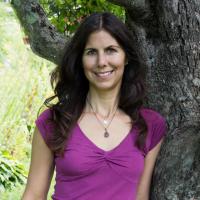View this post on Instagram
Our current political climate needs heart-centered, engaged citizens to take a stand for democracy. But what happens when we feel emotionally sensitive to what is going on, desiring to distance ourselves from the perceived toxic negativity to the point of not even wanting to talk about politics?
As someone who, for as long as I can remember, has looked on from a distance at our political system while feeling deep concern for what is happening, this inner turmoil has left me in a state of inaction.
That is until recently.
Last month, I heard Marianne Williamson—now a 2020 Presidential Democratic candidate—speak at a local event, and everything changed. When someone in the crowd asked her an emotionally charged question about our current political climate, Marianne responded by saying that our emotional sensitivity cannot be an excuse for our political disengagement.
She was speaking to me, to my complete unwillingness to get involved in the politics around me. She challenged the crowd to heal their own personal issues so they can become a part of the solution. And she reminded us that one person cannot change this country—it takes all of us.
Our emotions run deep. When we don’t process them they get lodged in our physical bodies and pull us down. We then find that we are unable to engage because we are carrying around too much emotional baggage. I couldn’t get involved because I needed to heal the emotions surrounding my disdain for the political system and replace it with a love and honoring of our democracy.
Since then, I’ve been working to clear out of my mind and body all of the negativity that I have harbored and choosing instead to become a part of the solution. To truly heal, both of these actions are needed—the clearing out and taking action. One without the other doesn’t bring full healing.
I am part of the solution when I get educated about what is really going on, instead of looking away; when I choose to get involved in what is going on in the political scene right around me; when I choose to not just gripe about the injustices but decide to do something about it.
This country needs healing. But the healing will come from each one of processing our own emotions and beliefs, and then engaging.
Here are some ways to turn our emotional sensitivity into political engagement:
- Acknowledge your Emotions. If you’re feeling angry or upset, or find yourself talking back to the person speaking about politics on the radio or television (that’s me!), call the emotion for what it is. Many of us emotionally sensitive types don’t like to admit that we feel this way, because we feel like we shouldn’t. But we do, so let’s start there.
- Ask the Why. Ask the emotion why it’s there. It’s important to go beyond the emotion to understanding why it’s erupting in the first place. When I’m feeling angry because I disagree with what’s being said, asking why helps me to see that what I’m really feeling is the pain of the injustice that I perceive in the situation.
- Clear Out and Replace. Once I’ve identified that it’s really injustice that is bothering me, I can clear out the anger and replace it with the desire to serve, to help overcome the injustice. I can take some deep breaths, let the anger go, and then fill up with an energy that will help me be of service.
- Take Positive, Engaged Action. Now I’m ready to take action, which might look like getting better educated on the bigger picture and deeper issues. Or it might be calling or writing my Senator. It might be going to a meeting where there can be civil conversation and dialogue. Actually, the willingness to engage in conversation is often the most powerful thing we can do, because it’s only then that things can begin to change. The point is to turn that original emotion into something positive that can make a difference.
More than ever, this country needs those of us who hurt and feel deeply to turn that energy into heart-centered political engagement. This is how we honor the democracy for which our country was founded, and it is the way we all can heal as we turn toward love to become part of the solution.











Read 6 comments and reply